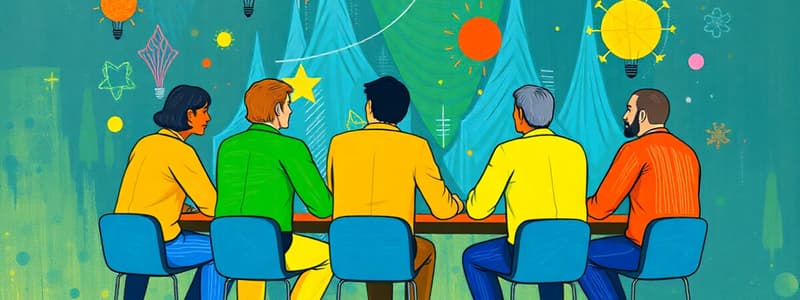Podcast
Questions and Answers
What is one of the benefits of a well-functioning team?
What is one of the benefits of a well-functioning team?
- Avoiding consensus decision making
- Disregarding individual roles
- Determining individual roles (correct)
- Promoting constant arguments
Which behavior fosters effective communication in a team setting?
Which behavior fosters effective communication in a team setting?
- Discouraging questions
- Talking over one another
- Civilized disagreement (correct)
- Ignoring contributions
What outcome may occur due to poor collaboration among team members?
What outcome may occur due to poor collaboration among team members?
- Enhanced team spirit
- Personality clashes and arguments (correct)
- Acceptance of team decisions
- Improved efficiency
Which principle emphasizes the importance of inclusivity in discussions?
Which principle emphasizes the importance of inclusivity in discussions?
What is essential for maintaining a focused and efficient team?
What is essential for maintaining a focused and efficient team?
What is the primary distinction between a team and a group?
What is the primary distinction between a team and a group?
Which of the following is NOT identified as a factor that erodes effective teamwork?
Which of the following is NOT identified as a factor that erodes effective teamwork?
Which characteristic is a criterion for an efficient team member?
Which characteristic is a criterion for an efficient team member?
What does the acronym T.E.A.M. in the context of teamwork stand for?
What does the acronym T.E.A.M. in the context of teamwork stand for?
What is a benefit of effective teamwork as mentioned?
What is a benefit of effective teamwork as mentioned?
Which statement is true regarding groups and teams?
Which statement is true regarding groups and teams?
Which behavior indicates a lack of commitment from a team member?
Which behavior indicates a lack of commitment from a team member?
What is a common challenge teams face when forming?
What is a common challenge teams face when forming?
Which of the following behaviors is least likely to promote a positive team environment?
Which of the following behaviors is least likely to promote a positive team environment?
What is a potential consequence of failing to develop trust among team members?
What is a potential consequence of failing to develop trust among team members?
Which of the following strategies best aligns with the principles of consensus decision-making?
Which of the following strategies best aligns with the principles of consensus decision-making?
How might excessive focus on individual roles negatively impact a team's performance?
How might excessive focus on individual roles negatively impact a team's performance?
Which practice is most critical for ensuring that all team members feel heard during discussions?
Which practice is most critical for ensuring that all team members feel heard during discussions?
What differentiates a team from a group within an organization?
What differentiates a team from a group within an organization?
Which factor is NOT a criterion for an efficient team member?
Which factor is NOT a criterion for an efficient team member?
What is a potential result of poor organization in a team?
What is a potential result of poor organization in a team?
Which of the following is a misconception about groups and teams?
Which of the following is a misconception about groups and teams?
Which is NOT a characteristic of effective communication among team members?
Which is NOT a characteristic of effective communication among team members?
What emerges as a challenge when team members are not committed?
What emerges as a challenge when team members are not committed?
How can misunderstandings negatively impact teamwork?
How can misunderstandings negatively impact teamwork?
Which option accurately describes an aspect of teams that differentiate them from groups?
Which option accurately describes an aspect of teams that differentiate them from groups?
Flashcards
Team effectiveness
Team effectiveness
The ability of a team to work together effectively and achieve their goals.
Mutual trust and understanding
Mutual trust and understanding
When team members trust and understand each other, leading to better communication and collaboration.
Consensus decision making
Consensus decision making
A team's ability to reach decisions that everyone agrees on, even if they disagree.
Active participation
Active participation
Signup and view all the flashcards
Commitment to assignments
Commitment to assignments
Signup and view all the flashcards
Team
Team
Signup and view all the flashcards
Group
Group
Signup and view all the flashcards
Poor organization
Poor organization
Signup and view all the flashcards
Misunderstandings
Misunderstandings
Signup and view all the flashcards
Work effortlessly
Work effortlessly
Signup and view all the flashcards
Trust
Trust
Signup and view all the flashcards
Good communicators
Good communicators
Signup and view all the flashcards
Supportive
Supportive
Signup and view all the flashcards
Comfortable team members
Comfortable team members
Signup and view all the flashcards
Trust within a team
Trust within a team
Signup and view all the flashcards
Individual Roles in a Team
Individual Roles in a Team
Signup and view all the flashcards
Active Team Participation
Active Team Participation
Signup and view all the flashcards
What is a Team?
What is a Team?
Signup and view all the flashcards
Team vs. Group: What's the Difference?
Team vs. Group: What's the Difference?
Signup and view all the flashcards
What are Factors That Can Stop a Team From Working Well?
What are Factors That Can Stop a Team From Working Well?
Signup and view all the flashcards
What are Qualities of Effective Team Members?
What are Qualities of Effective Team Members?
Signup and view all the flashcards
What are the Benefits of Having a Team?
What are the Benefits of Having a Team?
Signup and view all the flashcards
What are the Stages Teams Go Through?
What are the Stages Teams Go Through?
Signup and view all the flashcards
What Steps Do Team Members Take As They Develop?
What Steps Do Team Members Take As They Develop?
Signup and view all the flashcards
What Skills Do Team Members Develop as They Get Started?
What Skills Do Team Members Develop as They Get Started?
Signup and view all the flashcards
Study Notes
Team Work & Team Composition
- A group is a collection of people who commit to achieving a result.
- A team is a group whose members help each other achieve organizational goals. All teams are groups, but not all groups are teams.
- Teams are interdependent for overall performance
- Teams work together to achieve more than individuals could achieve alone.
- Key factors for team effectiveness:
- Shared leadership
- Trust and conflict management
- Effective use of resources
- Shared goals and objectives
- Periodic self-evaluation
- Experimentation/creativity
- Problem-solving decision-making
- Communication
- Control procedures
Effective Teamwork
-
Factors that hinder effective teamwork include:
- Poor organization
- Insufficient communication
- Misunderstandings
- Inadequate problem-solving procedures
-
Criteria for effective team members:
- Work effortlessly
- Trustworthy
- Good communicators
- Supportive
- Participation
- Innovation
- Motivated
-
Benefits of teamwork (collective knowledge & skills):
- Quick solutions
- Improved productivity
- Distribution of workload
- Diversity of ideas
- Better decision-making
- Motivation
- Learning
Stages of Team Development
- Tuckman's four stages of group development:
- Forming: Team members get acquainted, establish ground rules, and are treated as strangers
- Storming: Team members start communicating their feelings; still view themselves as individuals, resist control, and show hostility.
- Norming: People feel a part of the team, realize they can achieve work by accepting other viewpoints, and the team works in an open and trusting atmosphere
- Performing: The team works in an open, flexible and trusting atmosphere, hierarchy is less important, and the team assesses the year and implements a plan for transitioning roles and recognizing contributions
- Adjourning: The team conducts an assessment of the year, and implements a plan for transition
Organizational Stages
- Stage 1 - Forming: Discuss team purpose; might be excited about being chosen but might be uncomfortable, afraid to speak, and require developing trust and communication
- Stage 2 - Storming (Lack of Direction): Question why the team was formed; Find it hard to work together and make decisions; may distrust or not understand one another; personality clashes, arguments, and poor collaboration.
- Stage 3 - Norming: Begin to work together; leaders emerge; openly discuss issues by listening to each other, become more involved; feel good about themselves and the team; accept team decisions, and willing to work hard to carry them out.
- Stage 4 - Performing (Full Speed Ahead): Are committed to the team and organization; take responsibility for making improvements and examining the best way for the team to function; stay focused and work for the common good; work at maximum efficiency.
Team Ground Rules
- Attendance and punctuality
- Team spirit
- Consensus decision making
- Active participation
- Commitment to assignments
- Civilized disagreement
- Commitment to ground rules
- Respect everyone's contribution
- Everyone's opinion is valuable, no right or wrong answers
- Give everyone a chance to speak
- One conversation at a time, avoid interrupting
- Be open and honest
- Do not share information outside the room
- Everyone is free to ask questions
- A successful team comprises many hands and one mind.
Studying That Suits You
Use AI to generate personalized quizzes and flashcards to suit your learning preferences.




